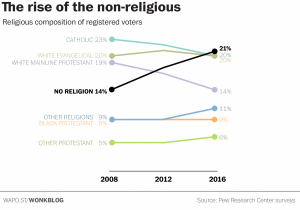Sen. Bernie Sanders will deliver the most important speech of his life on this opening night of the Democratic Convention. But more importantly, his prime time speech could prove to be of pivotal importance for America’s future.
If Sanders rises to the challenge, he can help unite progressive voters to win, not only the presidency, but a working majority of the Senate, House and U.S. Supreme Court. Those are high stakes indeed. But Sanders did not launch a campaign that won primaries and caucuses in 22 states to fade away as a short-lived blip on the 2016 political radar screen.
The stakes have been jacked up even higher by the wikileaks implicating DNC leaders, including Debbie Wasserman Schultz, in partisan advocacy of Hillary Clinton’s campaign and opposition to Sanders, long before Clinton clinched the number of delegates needed to win the nomination. A significant number of Sanders suporters are understandably pissed off about it, and the Sanders campaign call for Wasserman Schultz’s resignation months ago was clearly justified, with benefit of hindsight.
It is important to put the wikileaks controversy in context. There are reports that the leaks were engineered by Russian hackers, likely at Putin’s behest, a disturbing possibility considering the warm relationship between Putin and Trump. There should be no doubt, however, about the timing of the leaks being designed to manipulate public opinion against the Clinton campaign. In that sense, one question is, how many American voters will allow themselves to be manipulated by Russian meddling in our politics.
That possibility is made even more unsavory by Trump’s piling on about the wikileaks, and his direct appeals to Sanders voters to support his candidacy. Chances are he won’t get many votes from angry Sanders voters, most of whom are too sophisticated to get suckered by the likes of Trump. The greater concern for Democrats is the possibility that increased numbers of Sanders supporters will stay home or vote for Libertarian or Green party presidentical candidates, which is not so different in effect from voting for Trump.
The Republicans will want to put the worst possible face on the controversy, and they will imply again and again, without any proof, that the DNC favoritism was instigated by the Clinton campaign, even though it looks like the DNC leadership was so partisan they didn’t need any encouragement.
Sanders is not the only important speaker tonight. Elizabeth Warren will deliver the keynote address to the convention, and her speech will also be closely watched by millions of progressives nationwide. She, too, has a critical role to play in uniting progressives to defeat Trump. First Lady Michelle Obama provides another big draw. AFL-CIO President Richard Trumka and Sen. Cory Booker will also speak to the convention tonight.
I expect that both Sanders and Warren will do their best to support Clinton. Anyone who has paid close attention to Sanders during the last year — and throughout his career — can see that he is wholly dedicated to the vision of a progressive future for America. His campaign, contrary to comments made by some of his critics, has never been about gratifying his ego. By any fair measure, he is one of the most deeply-committed U.S. Senators, always focused on reforms to advance social and economic justice.
Some Democrats grumbled that Sanders didn’t support Clinton fast enough, after she clinched the needed number of delegates to win the nomination. Both he and Clinton wanted to time his endorsement for the optimum moment when it could do the most good. I will be greatly surprised if he doesn’t do everything he can to defeat Trump and elect Clinton.
Wasserman Schultz has tendered her resignation as head of the DNC, effective at the end of the convention. As of this writing, however, she is still expected to address the convention. This may be a really bad idea, especially since she has not yet apologized to Sanders. Her appearance could be the most divisive moment of the convention and would likely invite protest both inside and outside the convention center.
Part of the dilemma facing Democratic leaders is that Wasserman Schultz has been a highly-effective fund-raiser for Democrats, particularly in Florida, a critically-important swing state. She also did an excellent job of organizing the 2012 Democratic convention. No doubt Clinton and the Obama Administration are looking for a way to allow her to save face, while playing a diminished public role at the convention. If she has real dedication to the success of the Democratic Party, however, she should take the initiative and bow out gracefully.
So day one of the Democratic convention will have more than its share of high drama and reason for good ratings. If Democrats, lead by Sanders and Warren, can leverage the increased public attention into an opportunity to educate and inspire the confidence of millions of American voters, this can be another Democratic convention that shows which political party is best prepared to govern wisely.




